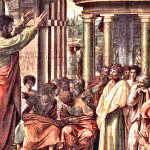A ‘God Problem’ at the New York Times
by Trent Horn
Filed under The Existence of God

When I saw that the New York Times had published an argument against the existence of God with a URL that contained the phrase “philosophy-God-omniscience,” it brought out my inner Catholic-apologist-geek. I became excited at the prospect of teasing out a philosophical puzzle.
But the only puzzle I came away with was this: how could a philosopher at a large public university publish a paper on the existence of God—in the nation’s most prestigious newspaper—that wouldn’t pass muster in a freshman philosophy class?
In his piece, titled “A God Problem,” Peter Atterton asks, “Does the idea of a morally perfect, all-powerful, all-knowing God make sense? Does it hold together when we examine it logically?”
Let’s find out.
Atterton first sets his sights on God’s omnipotence with the “paradox of the stone” as it often appears in the form of a question:
"Can God make a rock so heavy that not even he could lift it?"
Atterton notes, “If God can create such a stone, then he is not all powerful, since he himself cannot lift it. On the other hand, if he cannot create a stone that cannot be lifted, then he is not all-powerful, since he cannot create the unliftable stone. Either way, God is not all powerful.”
The answer to the seeming paradox depends on your definition of omnipotence. If you think it means God can “do anything” then he can make a stone he can’t lift and he can lift a stone he can’t make. But this solves the paradox only by throwing logic out the window (which as Atterton notes, some philosophers both past and present have been willing to do).
Fortunately, there’s no need to pay such a high price. When we define divine omnipotence correctly, as “the ability to make the possible actual” or “the ability to perform a logically possible task,” the paradox evaporates.
To put it another way: God can do anything but some strings of words don’t even count as “anything.” You might be able to say terms like “square circles” or “married bachelors” but those terms are as meaningful as a random string of letters like “jorshplat.” (Can God jorshplat? If you say no, is he therefore not omnipotent?)
The philosopher George Mavrodes notes that “a stone too heavy for God to lift” is simply another way of uttering the logically contradictory (and thus nonsensical) phrase, “a stone that cannot be lifted by him whose power is sufficient for lifting anything.”
But Atterton thinks even the “logically possible” explanation doesn’t work because God could have created a logically possible world without evil. “If God is morally perfect,” he writes, “it is difficult to see why he wouldn’t have created such a world. So why didn’t he?”
At this point, Atterton has taken his philosopher’s sights off omnipotence and switched his target to the attribute of omnibenevolence, or the fact that God is all-good, by appealing to the well-worn problem of evil.
Anyone with a basic understanding of it (much less someone with a PhD, as in Atterton’s case) should know that a suitable discussion of the problem of evil is going to take more than a paragraph. And yet that’s all he gives it. He writes, “The standard defense is that evil is necessary for free will,” and quotes Alvin Plantinga’s correct observation that creatures capable of moral good are also capable of moral evil. Atterton then replies to the free will defense by simply saying it don’t explain the problem of physical evil (like cancer or the harm earthquakes cause to humans) or the problem of animal suffering.
Atterton would have been better off dedicating his whole column to these problems instead of briefly discussing and then giving up the paradox of omnipotence or the problem of evil. If he had done this, then he would have had space to address one of the many replies theists have given to these problems including:
- the connection between the moral evil of original sin and our fallen, human natures;
- the opportunities for humans to exhibit moral virtues like courage and compassion;
- the necessity of pain and destruction in a finite, material world that is journeying towards perfection;
- common misunderstandings we have about the nature and ultimate purpose of non-human animal suffering. Our inability to see God’s eternal plan and know the greater good he can bring from any evil be it moral or physical.
The answer to the problem of pain is the same as the answer to the problem of evil: an all-good God can allow evil and pain to exist if he has a good reason for doing so, and the burden of proof is upon the atheist to show that no such reason or reasons exist.
Even philosophers of religion (which is not Atterton’s area of expertise) who themselves are not religious agree that this burden cannot be met. The agnostic scholar Paul Drapersays that “theists face no serious logical problem of evil” and the late atheist J.L. Mackieadmitted, “The problem of evil does not, after all, show that the central doctrines of theism are logically inconsistent with one another.”
Finally, Atterton gets to the section I was most interested in hearing about: the alleged logical contradictions involved with God’s being omniscient. One of the most meticulous critiques of omniscience comes from philosopher Patrick Grim (though well-refuted, ironically, by atheist Jordan Howard Sobel), and I was hoping Atterton would offer a similarly well-thought-out argument.
But instead all we get is this relatively simple argument:
"If God knows all that is knowable, then God must know things that we do, like lust and envy. But one cannot know lust and envy unless one has experienced them. But to have had feelings of lust and envy is to have sinned, in which case God cannot be morally perfect."
Just as the paradox of the stone is resolved by providing a more coherent definition of omnipotence, the “paradox of sinful knowledge” is resolved by providing a more coherent definition of omniscience. For example, if you define omniscience as knowing only and all propositional knowledge (or truths like “Fred is six feet tall” or “E=MC2”) then there is no puzzle about God having sinful experiential knowledge like feelings of lust or malice.
But you can also define omniscience more comprehensively as the knowledge of all real or possibly real things. Since evil is an absence of good it is not a “real thing” for God to know but a privation or absence God recognizes. According to St. Thomas Aquinas, “by the fact that God knows good things, He knows evil things also; as by light is known darkness.” God perfectly knows our human emotions because he sustains their very existence. As a result, he knows when they lack something like charity that causes them to become evil.
However, since God is unlimited and perfect being that does not change it doesn’t make sense to say God has emotions or feelings. But this fact about God doesn’t detract from his attribute of being all-knowing. As I wrote in my book Answering Atheism, “Since the statement ‘God is afraid’ (and others like it) is meaningless, it can’t be true. If it can’t be true, it can’t be known. And if it can’t be known, then it can’t contradict God’s omniscience, which involves his knowledge of only all real or potentially real things.”
Arguments like Peter Atterton’s do serve at least one useful purpose: they show how a confused or incorrect understanding of God can lead to rejecting God. Atheist Richard Carrier correctly notes, “Arguments from [God’s] incoherence aren’t really arguments for atheism, but for the reform of theology.”
If our understanding of God seems to be illogical, all this may show is that we must commit to loving the Lord with all our mind (Luke 10:27) and seek his help to elevate our minds to understand him. The Catechism puts it well:
God transcends all creatures. We must therefore continually purify our language of everything in it that is limited, image-bound or imperfect, if we are not to confuse our image of God—“the inexpressible, the incomprehensible, the invisible, the ungraspable”—with our human representations. Our human words always fall short of the mystery of God (42).
Related Posts
Note: Our goal is to cultivate serious and respectful dialogue. While it's OK to disagree—even encouraged!—any snarky, offensive, or off-topic comments will be deleted. Before commenting please read the Commenting Rules and Tips. If you're having trouble commenting, read the Commenting Instructions.












